Arizona secretary of state candidate Mark Finchem doesn't trust elections. Now he wants to run them
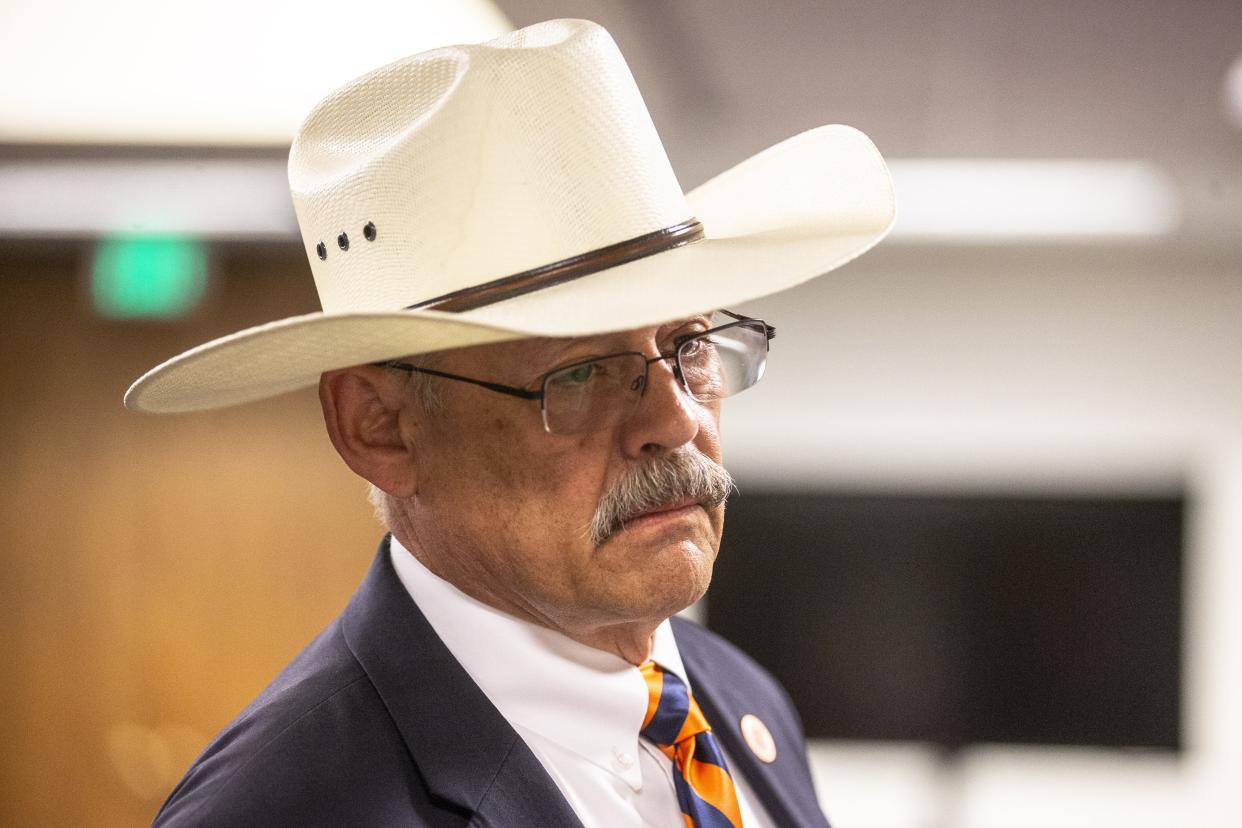
Mark Finchem tells the story of a late-night search for three men suspected of pulling off a string of robberies in Kalamazoo, Michigan, three decades ago.
An officer with the local police department at the time, Finchem stopped a suspicious vehicle but didn't have the evidence needed to make an arrest. As he turned back toward his car, he noticed the stopped car's trunk was slightly ajar and got a bad feeling.
He later learned a man was in there with a sawed-off shotgun.
“I knew when I got out of my car something was wrong," Finchem said. "I didn’t know what.”
That's how he views the 2020 presidential election, the event that has catapulted him to national notoriety and is propelling his bid as Arizona's next secretary of state. Something was wrong, he felt.
“People see things they know are just wrong, but they don’t know what," he said in an interview late last year.
He says he's here to sort it out for them.
Finchem's explanation is simple: There were irregularities in the 2020 election, and thus the results aren't trustworthy.
"Trump won. Period," he has said on multiple occasions.
His belief that the 2020 election was stolen from Donald Trump — absent any evidence of significant problems presented in court or enough irregularities from multiple audits to swing the vote — catapulted Finchem, 65, into a bid for the state's top election office and earned him Trump's endorsement. Given the secretary of state's role in certifying election results, Finchem's candidacy has drawn national scrutiny as one of the top election deniers running for office in 2022.
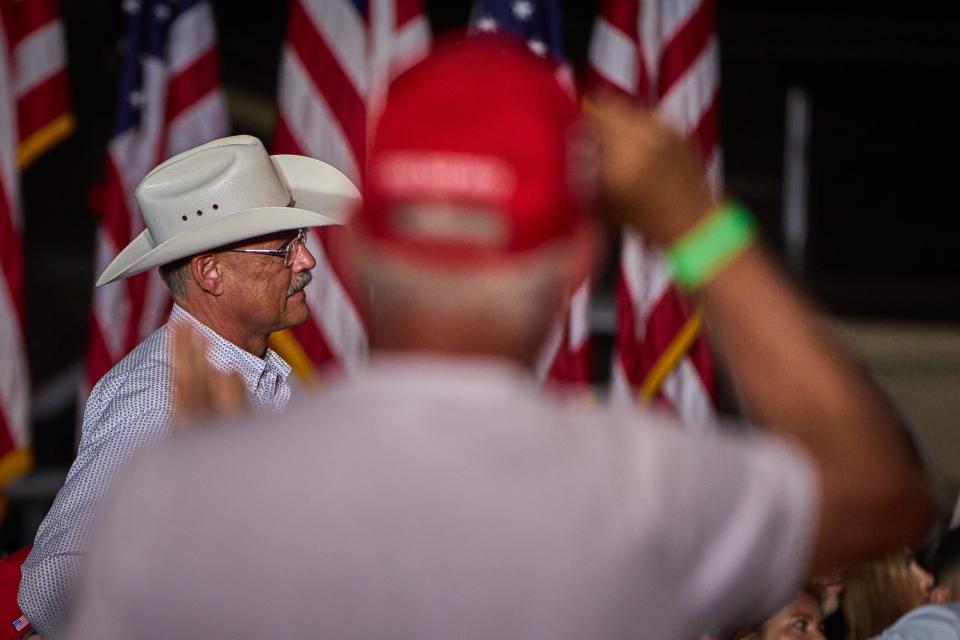
He’s dished up plenty of material for avid supporters to chew on and alarmed opponents alike as his campaign churns toward the Nov. 8 general election.
He advocates for a radical shift in how elections are conducted, from the abolition of the popular early voting system (with exceptions for absentee voting for people out of town on Election Day) to posting ballot images online to a switch to ballot paper embedded with numerous "counter fraud" features.
He believes ballots should get hand-counted and has argued the state Legislature has the power to set aside presidential election results if lawmakers believe there is illegality in how those results were obtained.
Along with GOP candidate for governor Kari Lake, Finchem sought a preliminary injunction in federal court to block the use of electronic machines in the November election. The judge dismissed the case but the duo is appealing to the 9th U.S. Circuit Court of Appeals.
He promises to ensure Arizona’s election laws are followed, an oblique reference to court rulings that stopped his Democratic opponent, Adrian Fontes, from changing several election procedures while Fontes served as Maricopa County recorder.
Finchem has salted these policy pronouncements with unapologetic comments that Democrats are "Marxists," that former Vice President Mike Pence was part of a coup to oust Trump from office and that what he saw at the U.S. Capitol on Jan. 6, where he was present, was “malicious destruction of property,” but not an insurrection.
He’s charged that Democrats are beholden to deep-pocketed donors George Soros and Michael Bloomberg, drawing complaints of antisemitism. Those critiques are amplified by Finchem’s association with known antisemites, such as his endorsement of a candidate for the Oklahoma Legislature, as well as his endorsement by Andrew Torba, the founder of the white nationalist platform Gab, who has written that Jews control the government.
Finchem denies the characterizations and defends his comments as political speech.
Finchem vs. Fontes: Candidates for secretary of state debate in Phoenix
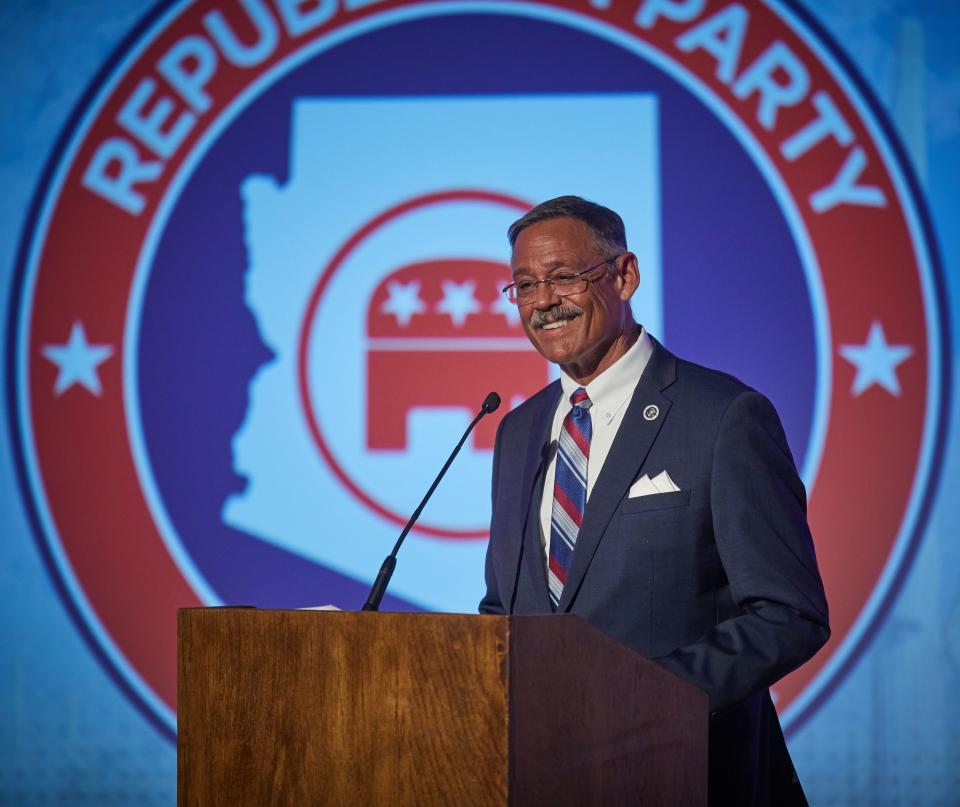
Finchem's path to politics
Finchem wasn't always an election crusader.
An associate real-estate broker from Oro Valley, he won a legislative seat in 2014 on a platform of personal and economic freedom. He described himself as a member of the Oath Keepers, "committed to limited, constitutional government." The Oath Keepers are considered an extremist group and were involved in the Jan. 6 attack on the U.S. Capitol. Finchem was outside the Capitol that day to deliver a speech that was canceled and claims he never went into the Capitol.
He easily won re-election three times in the Republican-dominated district.
Finchem arrived in southern Arizona in 1999, lured by a job offer from American Airlines to work in its Southwest reservations center. He had retired from public safety work as a firefighter and later a police officer in Michigan, where he did some ranching ("raised horses, cows and sheep," he said) on the side.
“A pretty boring life, that’s why I liked it," he said of ranching, describing it as "rehab time" from the stresses of police work. "I raked a lot of hay in my day.”
In Arizona, he had varied work experience, from an advertising startup called ReadmyRear.com that made banners for the backs of vehicles, to consulting for a clean power company to real estate. He let his real estate license lapse last year, records show.

Election guide: November 2022
City races | School boards | State | Governor
| Ballot measures | Federal races | How to vote
He also pursued education beyond the associate of applied science degree in criminal justice that he earned at Kalamazoo Valley Community College. He got a bachelor's degree in public policy from Grand Canyon University in 2019 and recently completed a master's degree in law and economics from the James E. Rogers College of Law at the University of Arizona. Early last year, he falsely claimed he had a fellowship at the law college, a claim the college rebutted.
“There’s always more to know, there’s always more to be fascinated by," he said, adding the 400-level economics class he took at UA "was pretty stout."
"I suppose you could call me a Renaissance man," he said. "I’m always trying to learn something new."
Along his learning path, he earned a Six Sigma certification in process excellence, a credential he believes will serve him well as secretary of state. The Six Sigma is a method to improve efficiency in business operations.
Transition to election conspiracist
Finchem said he got that "something's wrong" feeling during the 2016 election, which Trump won, saying everyone was cheating. But it wasn't until the aftermath of the 2020 election that he set about doing something about it.
Benny White, a Republican who was running for Pima County recorder in 2020, said he never heard Finchem talking about elections when they were at the same campaign events.
But three weeks after the election, Finchem convened a meeting at a downtown Phoenix hotel with Trump's lawyer Rudy Giuliani to discuss the election results. It fell on the same day state officials certified Arizona's election results, sealing Joe Biden's win.
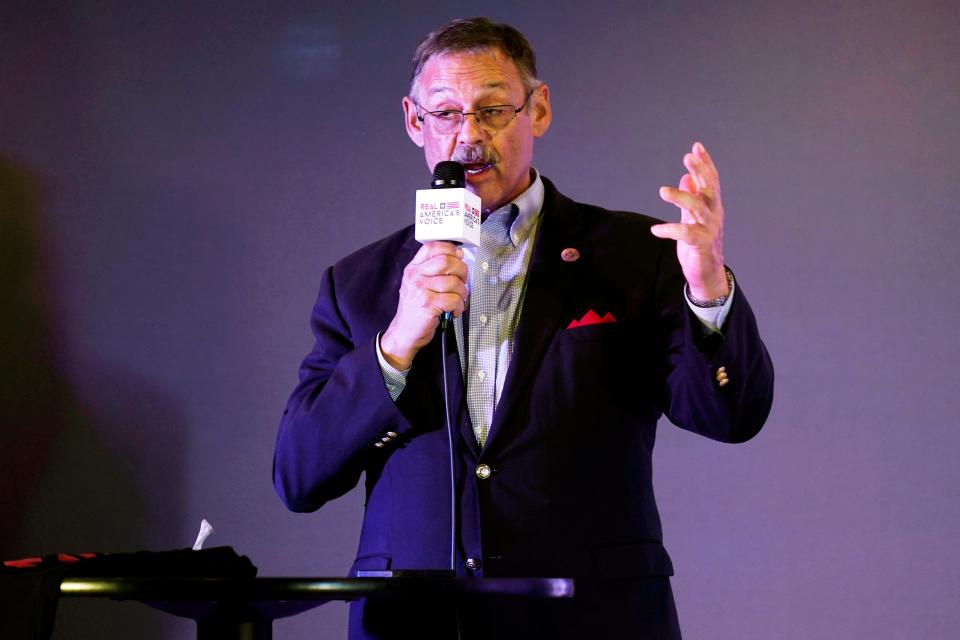
That Nov. 30, 2020, meeting made him "the national spokesman for election integrity," he told The Republic. It's not a term he put on himself, he added, but one he earned by his insistence that the election was stolen.
He says the information he gathered prompted the state Senate Republicans to launch an audit of Maricopa County's election returns. That review of cast ballots found more votes for Biden than the official record and verified that the county's vote tabulation machines were not connected to the internet — dashing claims from Finchem and other election skeptics that the county botched the election.
He held a similar hearing in his home base of Pima County in December 2021 and delivered what he said was proof of election malfeasance to Attorney General Mark Brnovich.
The Attorney General's Office confirmed in August that Finchem has not met with state investigators, nor has he provided the evidence that he predicted would spark a criminal investigation and a grand jury probe.
During this year's legislative session, Finchem introduced a resolution to reclaim Arizona's presidential electors because he claimed the election results in Maricopa, Pima and Pinal counties were "irredeemably compromised." To bolster his argument, he submitted a packet of legal memos and congressional transcripts to Republican House Speaker Rusty Bowers after a former Trump adviser had lobbied Bowers to advance the resolution.
Finchem's resolution never got a hearing.
During a September debate with Fontes, Finchem reiterated his belief that 2020 election results were “irredeemably compromised” and cited indictments brought against three people in Yuma County.
Ultimately, two people pled guilty to ballot harvesting for illegally returning four ballots of non-family members. This occurred during the 2020 primary election for a local city election, not the general election, where the presidential race was determined, according to an investigation by the state Attorney General’s Election Integrity Unit.
Finchem has not addressed the fact that the indictments had no effect on the presidential outcome and were not related to that election. His concern centers on the fact that not everything ran perfectly.
“I’m talking about if an election is mismanaged what recourse do the people have?” Finchem said during the debate.
Fontes said the answer is to follow the law, which state prosecutors did in the Yuma County case.
Fundraising with fringe
Finchem has not limited his campaigning to Arizona. He traveled to Newport Beach, California, last month for a fundraiser hosted by Nicole Nogrady, a conspiracy theorist who has promoted beliefs that fetal tissue is used to produce some food and drink products by corporate American, and who believes the U.S. government launched the 9/11 attacks.
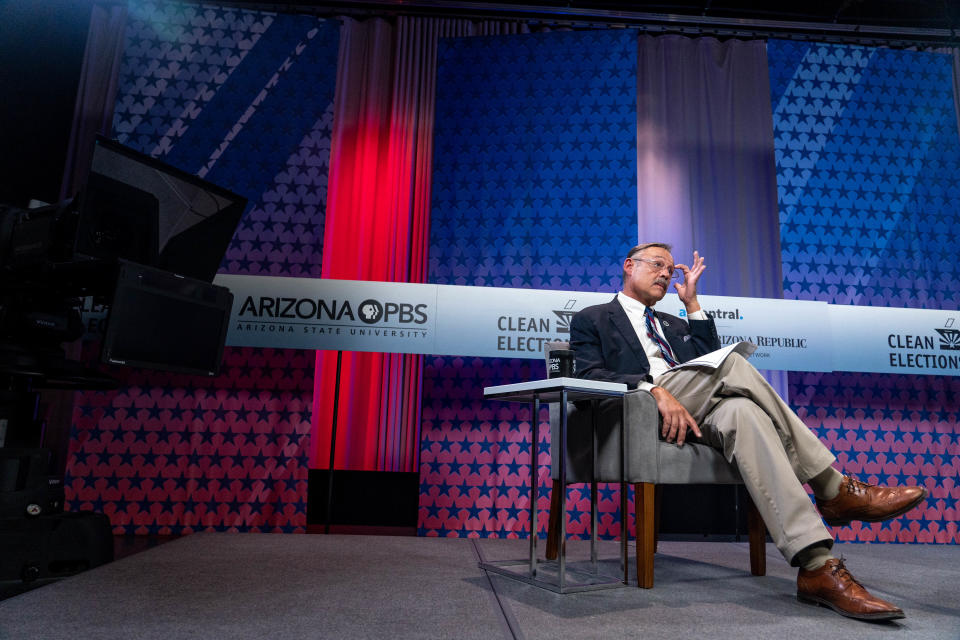
The event was promoted by former Trump adviser Steve Bannon and former Trump national security adviser Michael Flynn.
Finchem has made several trips to Mar-A-Lago, according to his campaign fundraising reports, and in August spoke at a Wisconsin meeting of the Church Militant movement, which proclaims itself the Christian militia, and battles against "sin, the devil and the demonic rulers of the darkness of this world."
He comments regularly on conservative news sites and is a regular guest on Bannon's War Room podcast, where in early October he claimed that 55,000 voters needed to be dropped from Arizona's voter rolls.
He raised $1.2 million as of mid-July, the latest report available, in mostly small-dollar donations from across the country. The next campaign finance report is due by Oct. 15.
Reach the reporter at [email protected] and follow her on Twitter @maryjpitzl.
Support local journalism. Subscribe to azcentral.com today.
This article originally appeared on Arizona Republic: Arizona secretary of state 2022 Republican candidate: Mark Finchem
